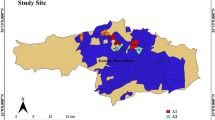Abstract
A reliable estimate of the quantity of solid waste generation in the city is very important for proper solid waste planning and management. However, reported estimates of solid waste generation vary widely and lead to questionability. The reported values have been derived on the assumption of demography, standard rate of waste generation by households, density values, number of trucks engaged for waste transportation and monitoring of truck movement at dump sites, etc. This diverse nature of the available data and the question of accuracy necessitate a rigorous study that has tried to document the waste quantity in the recently formulated master plan of Dhaka City. The socio-economic parameters, behavioral characteristics, generation sources, seasonality, and per capita growth rate are considered in estimating the waste quantity along with its future projections. The findings from the estimation of waste quantities state that seasonal differences in the municipal solid waste stream are not substantial. The most seasonably variable material in the municipal solid waste stream is food waste. Residential waste is relatively homogeneous. Although there are some differences in waste generation depending on demographic and other local factors, most households dispose of essentially similar types of wastes. Variation occurs in waste composition dependent upon income levels and category of sources. Variation also occurs based upon the extent of source reduction and recycling opportunities. As opportunities exist to recycle wastes, the recycling facilities might have to grow at a similar pace to the generation of waste. Physical and chemical characteristics of solid waste are important to implement the waste disposal and management plan for the selection of resource and energy recovery potentials. A number of studies have been conducted to determine the composition of wastes including moisture content and calorific value. The data show that the moisture content in city waste is significantly higher and the calorific value is much lower, which determines the viability of composting or anaerobic digestions rather than waste combustion.
Similar content being viewed by others
References
Alamgir, M., McDonald,C., Roehi, K. E., & Ahsan, A. (2005). Integrated management and safe disposal of MSW in least developed asian countries- A feasibility study, WasteSafe. Khulna University of Engineering and Technology, Asia Pro Eco Programme of the European Commission.
BCAS. (1998). Refuse quantity assessment of Dhaka city corporation for waste to electrical energy project, final report. World Bank, GOB, Dhaka, Bangladesh: Bangladesh Centre for Advanced Studies.
BCSIR. (1998). Refuse quality assessment of Dhaka city corporation for waste to energy project, institute of fuel research and development. World Bank, GOB, July, Dhaka, Bangladesh: Bangladesh Council of Scientific and Industrial Research.
Bhide, A. H. (1990). Solid waste management at Dhaka, Khulna and Natore. WHO Project BAN CWS 001: Detailed Technical Report.
Bhuiyan, M. S. H. (1999). Solid waste management of Dhaka city. Paper presented at the seminar on solid waste Management, DCC, Dhaka, Bangladesh.
BKH. (1985–86). Housing development project-subcontract “A”, Annexure-V- solid waste management. The BKH Consultant, Delft, The Netherlands., UNDP, UNCHS (Habitat).
BUET. (2000). Characterization of municipal solid waste and preliminary environmental impact assessment of collection and disposal works in Dhaka city’. Department of Civil Engineering, Bangladesh University of Engineering and Technology, BRTC, DCC.
DCC. (1985). Dhaka city corporation, Unpublished Report.
Diaz, L. F., Savage, G. M., & Eggerth, L. L. (1993). Composting and recycling municipal solid waste. CalRecovery, Inc., USA.
JICA. (2005). The study on solid waste management in Dhaka city. Clean Dhaka Master Plan, Final Report, Japan International Cooperation Agency, Pacific Consultants International, Yachiyo Engineering Co., Ltd.
LBI. (1990). Dhaka integrated flood protection project (FAP-bB). Louis Berger International, ADB.
MMI. (1991). Dhaka Metropolitan Development Planning (DMDP) Waste Management Report’, Mott Macdonald Int. Ltd. And Culpin Planning Ltd., UNDP, UNCHS, GOB, RAJUK.
PAS. (1997). Integrated Waste Management Programme for Dhaka City Corporation’, Waste to Energy Plant, Composting and Multiple Thermal By-products, Pan Asia Services Ltd. Dhaka and CGCA-ONYX, France.
PCI. (1991). Greater Dhaka protection project. Pacific Consultants Internationals International, Japan.
RSWC. (1998). Waste landfilling and hospital waste incineration in Dhaka ROTEB-Solid Waste Consultancy. B.V. Netherlands.
Tchobanoglous, G., Theiswn, H., & Vigil, S. (1993). Integrated solid waste management. McGraw-Hill International Editions, Civil Engineering Series, Nework, U.S.A.
UNCRD. (1998). Compendium of facts and figures on solid waste management in asian metropolises, prepared for UNCRD Research Project RES/642/87 on improving solid waste management in the context of Metropolitan Development and Management in Asian Cities.
Wang, H., & Nie, Y. (2001). Municipal solid waste characteristics and management in China, Technical Paper. Air and Waste Management Association, 51, 250–263.
Yousuf, T. B. (2005). Sustainability and replication of community-based composting-a case study of Bangladesh. PhD Thesis, Loughborough University, UK.
Author information
Authors and Affiliations
Corresponding author
Rights and permissions
About this article
Cite this article
Yousuf, T.B., Rahman, M. Monitoring quantity and characteristics of municipal solid waste in Dhaka City. Environ Monit Assess 135, 3–11 (2007). https://doi.org/10.1007/s10661-007-9710-6
Received:
Revised:
Accepted:
Published:
Issue Date:
DOI: https://doi.org/10.1007/s10661-007-9710-6




